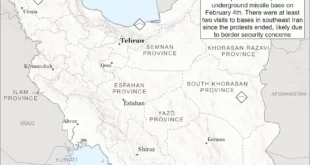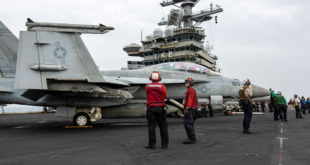 Iran has played a vital role in the agreement between the two Iraqi Shiite leaders Abdul Aziz Al Hakim and Muqtada Al Sadr to avoid an “open war” among the Iraqi Shiites, Iraqi politicians and analysts said. The two leaders have vowed peace amid escalation of armed clashes and assassinations between the Islamic Supreme Council, led by Al Hakim and Al Sadr’s Mahdi Army in Shiite southern provinces in Iraq.
Iran has played a vital role in the agreement between the two Iraqi Shiite leaders Abdul Aziz Al Hakim and Muqtada Al Sadr to avoid an “open war” among the Iraqi Shiites, Iraqi politicians and analysts said. The two leaders have vowed peace amid escalation of armed clashes and assassinations between the Islamic Supreme Council, led by Al Hakim and Al Sadr’s Mahdi Army in Shiite southern provinces in Iraq.
“I believe that Iran played an important role in urging Al Hakim and Al Sadr to sign a peace agreement, which was signed on Friday and was announced on Saturday, especially when the bloody violence in Karbala in August showed the amount of hostility between the Mahdi army and Al Hakim’s armed wing,” Abbas Al Asadi, a political researcher in Najaf, told Gulf News.
Although the statement released by Al Hakim’s office did not mentioned the exact date or location of the agreement with Al Sadr, sources in the Shiite coalition suggested the agreement had been signed in Iran where Al Hakim is undergoing treatment for cancer.
Jaafar Al Shaibani, an activist in Shiite Hawza studies, told Gulf News, “The peace agreement between Al Sadr and Al Hakim was dictated by challenges and risk of a civil war outbreak between Shiites.”
However, he added the agreement should not be seen as “a magic wand” to solve all problems and stop assassinations.
The Hakim-Al Sadr peace agreement concludes three main items: strengthening relationships between the two parties, unifying and coordinating their cultural messages and media releases statements and forming a joint committee to resolve disputes.
Political advisor to the head of SIIC Mohsen Hakim told FNA on Saturday that the committee which will have branches in all Iraqi provinces is aimed at defusing enemies’ plots and solving the problems existing in the different provinces of the country.
He said the committee will seek to resolve the differences between the two sides, adding that the agreement which is the first of its kind also “reiterates the need for respecting the sanctity of the blood of the Iraqis from all religions, faiths and ethnicities and requires the two sides to refrain from launching negative propaganda against each other in all political and cultural activities and during Friday Prayers sermons.”
 Eurasia Press & News
Eurasia Press & News



